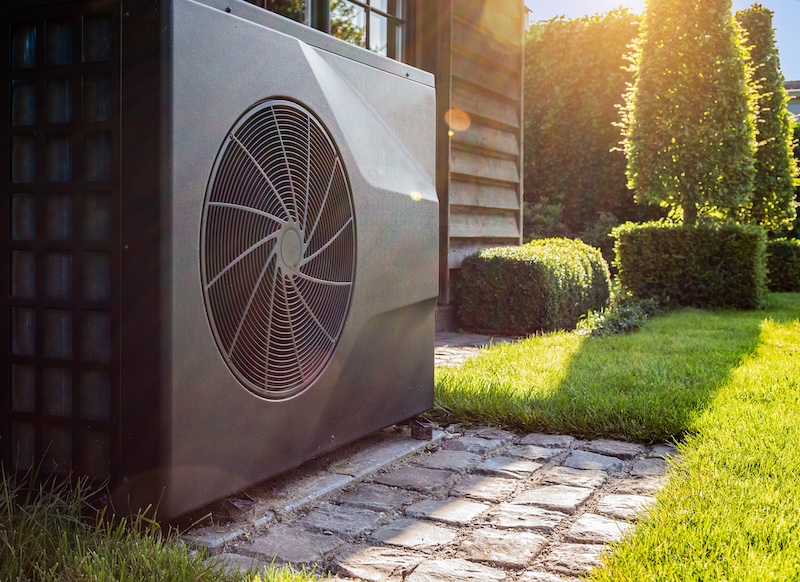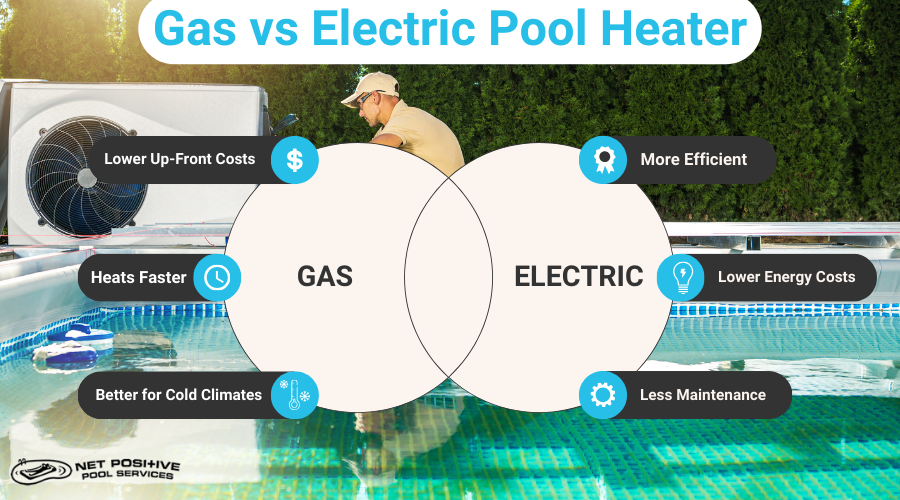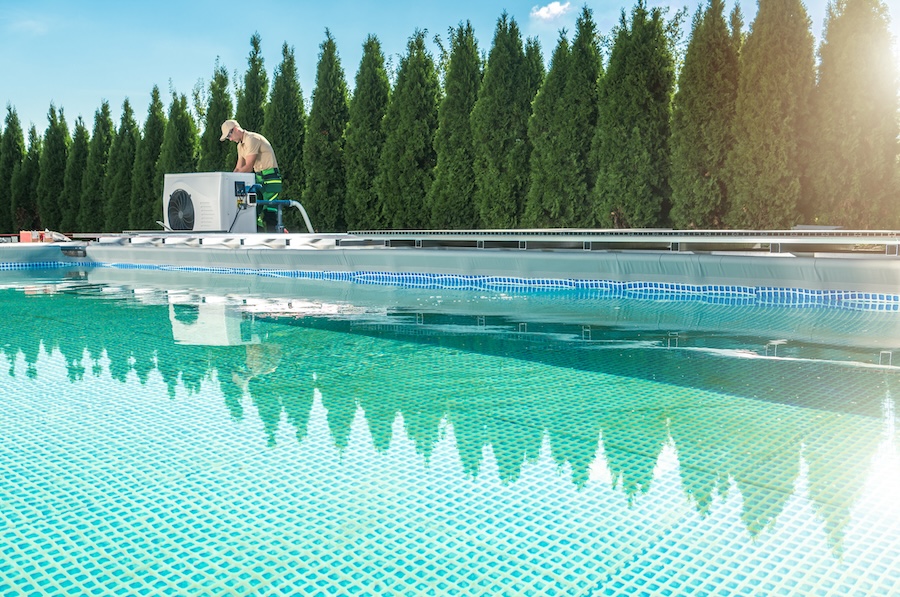Jump To
If you’re a swimming pool owner deciding between a gas or an electric heater, it’s crucial to differentiate the two to make the best possible decision. Both these pool heaters are efficient methods of adjusting your pool temperature, no matter the outside temperature. However, their performance, operation, and cost-efficiency are different.
A gas pool heater uses natural gas or propane in its combustion chamber to warm the pool water. It’s known for heating pools in a shorter timeframe, making it an apt choice for rare and quick swims. On the other hand, an electric pool heater, specifically an electric heat pump, absorbs heat from the air—working similarly to an air conditioner but in reverse—to heat the pool water. This type of heater works more efficiently by consuming less energy, yet they need a longer time to heat the pool.
Depending upon your swimming habits, geographical location, desired water temperature, maintenance expectations, and budget, the answer to the “gas vs electric pool heater” will differ. In the sections to follow, we’ll make this choice easier by diving deeper into these pool heaters’ operations, comparisons, considerations, and more.

The Basics of Gas and Electric Pool Heaters
A pool heater is a device that adjusts your swimming pool’s water temperature to your liking, extending the pool season even if the air temperature doesn’t quite match your preference. A pool heater transitions a swimming pool from being a seasonal luxury to a frequent home retreat, even during the cooler months of the year.
Gas Pool Heaters and How They Work
Gas heaters utilize a propane heater, making them an excellent choice if you already have access to a gas line. These heaters warm your pool water by burning the gas in a combustion chamber. The pool water circulates through the heater, picks up the heat from the combustion process, and then returns to your pool, creating a warmer pool environment.
One of the highlights of gas heaters is their ability to warm up your pool quickly, regardless of the outside temperature. So whether it’s a refreshing early-morning swim or a late-night dip during the winter months, a gas pool heater has you covered.
Electric Pool Heaters and How They Work
Electric heaters are often referred to as electric heat pumps. These devices work on the principle of heat exchange—they absorb the heat from the surrounding air and transfer it to your pool water. The cool air is then ejected back out of the heat pump, leaving your swimming pool with the perfect temperature.
Unlike gas heaters, electric pool heaters are dependent on the air temperature—they become less efficient as the air temperature drops. However, they work well in average to warmer climates like those found in the Carolinas and are known for their remarkable energy efficiency.
Pool Covers
Regardless of the type of pool heater, incorporating a pool cover can prevent heat from escaping and conserve the pool’s temperature. You’ll have lower heating requirements and thus reduce energy costs, making it practical with both types of pool heaters.

Comparison Between Gas and Electric Pool Heaters
Efficiency
When it comes to operational efficiency, electric heaters win the battle. The heat pump in the electric heater captures and multiplies heat from the surrounding air—making it an environmentally friendly solution. In contrast, gas heaters, while offering rapid heating, consume more fuel, resulting in less energy efficiency.
Energy Costs
While gas heaters heat the pool quickly, they can consume a lot of propane or natural gas, resulting in higher energy costs. Conversely, electric pool heaters operate on electricity to heat the surrounding air, resulting in lower energy costs over time—though the upfront expenses are higher.
Operation and Maintenance Costs
Unlike electric heaters, gas heaters have lower upfront costs but require regular maintenance to maintain efficiency. Their maintenance includes regular checks of the combustion chamber and the heat exchanger, among other components. On the other hand, while the cost of electric heat pumps is high in the beginning, their maintenance costs generally remain lower over time.
Hot Tub Compatibility
If you want a hot tub alongside your pool, an electric heat pump might not be the best option because it can take a while to heat the water to the desired hot tub temperatures. In this case, a gas pool heater with its quick heat-up time proves efficient.
Factors to Help Choose Between Gas and Electric Pool Heaters
Swimming Season and Frequency
Do you prefer brief dips or long and frequent swims? If you have a preference for impromptu swimming sessions and quick heating, a gas heater might be the choice for you. In contrast, if you enjoy extended pool seasons with lengthy and regular swims, an electric heater can efficiently maintain the perfect pool temperature for weeks or even months.
Pool Size and Desired Temperature
Large pools require more energy to heat. Thus, for bigger pool sizes, gas heaters could potentially skyrocket your energy bills. In these scenarios, electric heaters might be a more economical choice with their lower operational costs, especially if you’re maintaining a high average temperature throughout the season.
Climate
The efficiency of electric heaters decreases in cooler climates due to their operational mechanism. If your area experiences a colder climate of outside temperatures for most of the swimming season, a gas heater might be the best option.
Budget and Sustainability
In terms of upfront costs, gas heaters are generally less expensive than electric heaters. However, while considering ongoing costs, electric heaters tend to be more cost-effective due to their lower operating costs and minimal maintenance needs. Moreover, electric heaters, with their heat pump system absorbing heat from the air, prove to be a more sustainable and eco-friendly solution.
The best heater for your pool would be the one that fits most of your needs. But to ensure it stays the best, proper maintenance, and care are a must.

Trust Net Positive Pool Services for Your Pool Heating Needs
Finding the right pool heater for your swimming pool might seem challenging, but at Net Positive Pools, we are committed to making this complex decision straightforward for you offering many options from leading brands like Jandy in our brick-and-mortar store.
We take pride in our unmatched expertise in understanding your pool requirements and have developed an outstanding track record in providing effective, efficient, and affordable pool services. Whether you are looking for weekly full-service or chemical-only options, our Weekly Pool Maintenance Program is designed to provide a one-stop solution for all your pool’s needs, including maintenance of pool heaters and pool equipment. Our comprehensive services extend from acid wash, filter cleaning, green-to-clean, liners, safety covers, and salt cell cleaning, to weekly maintenance and equipment repairs.
At Net Positive Pools, we aim to provide you with a service that delivers satisfaction in every aspect. We cater to all pool needs in Huntersville, NC, Greenville, SC, Statesville, NC, York County, SC, and Charleston, SC, and continue to build a community of happy customers.
Choosing the correct pool heater for your outdoor pool is important, but having a reliable and expert service provider matters even more. Net Positive Pools is ready, equipped, and looking forward to being your trusted partner in all your swimming pool needs.
Dive into comfort with us! Contact us today to see how we can help you with your pool maintenance.
Resources
https://afdc.energy.gov/fuels/propane-basics


